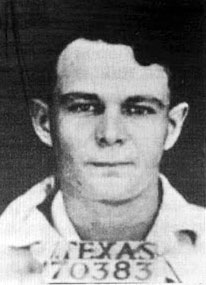Ralph Fults (Ralph Fults)

Born to a U.S. postal worker in Anna, Texas, Ralph Fults was arrested in Aspermont, Texas after police found him carrying a suitcase full of stolen goods. The 14-year-old Fults escaped from the town’s jail a week later after making a key from an old tobacco can. With the town sheriff attending the county fair, Fults was able to start a mass jailbreak, letting the remaining inmates out of jail. However, Fults was soon recaptured and sentenced to the Gatesville State School, which he escaped from on April 16, 1927. Two years later, Ralph Fults was arrested and convicted of burglary after selling stolen cigarettes to a grocer in Greenville, Texas. Given a two-year prison sentence, Fults arrived in Huntsville Prison on June 16. He was eventually transferred to Eastham prison farm, from which he escaped with two other inmates on April 8, 1930. Recaptured five months later while burglarizing a hardware store in St. Louis, he was sent back to Texas, where he received a parole on August 16, 1931. During his time in prison, he had become acquainted with many criminals and outlaws of the “public enemy era” and helped smuggle hacksaw blades to bank robber Ray Hamilton to escape from jail in McKinney, Texas on January 27, 1932. He later joined up with Hamilton on March 22 and, along with Bonnie Parker and Clyde Barrow, attempted to rob a hardware store in Mabank, Texas. However, after the night watchmen sounded the alarm, the four fled in a stolen car until Barrow drove into a mud hole, which bogged the car down. Although Barrow and Hamilton were able to escape on foot, Fults and Parker were arrested by arriving police.
Ralph Fults was sentenced to ten years imprisonment on May 11, 1932 although he was later granted a pardon by Governor Miriam A. Ferguson shortly before leaving office on January 10, 1935. Rejoining Hamilton less than a month later, the two stole eight Thompson submachine guns from a National Guard armory in Beaumont, Texas. After stealing a car in Tulsa, Oklahoma on February 24, he and Hamilton headed for Texas after managing to evade a police ambush while passing through McKinney. On March 19, the two gave an interview to a Houston journalist detailing inhumane treatment in the Texas penal system. That same afternoon, he and Hamilton robbed a grocery store in San Antonio. Three days later, while driving towards Mississippi, the two stopped at the Louisiana site where Bonnie and Clyde had been killed the previous year. Stealing a car in Hattiesburg, Mississippi on March 27, he and Hamilton robbed a bank at Prentiss, Mississippi the following day. After this latest robbery, the two separated, with Ralph Fults boarding a train to Louisville, Kentucky and Hamilton returning to Texas. However, after his arrival in Springfield, Illinois on April 5, Fults had learned of Hamilton’s arrest at Fort Worth that same day and immediately took the first bus bound for Texas. Fults reached Fort Worth on April 8 and, although perhaps planning to save his old partner from the electric chair, he instead drove to his mother’s home in McKinney. Stealing a car from Renner, Texas on April 12, he and an unidentified accomplice stole $900 from an oil refinery in Graham, Texas.
Captured by police in Denton County, Texas on April 17, his latest crime spree came to an end and he was returned to Huntsville prison until his extradition to Mississippi to face bank robbery charges. Convicted in September 1935, he was sentenced to fifty years imprisonment at the Parchman prison farm. Although he was put in solitary confinement for leading a prison strike, he was pardoned in 1944 and thereafter assumed a legitimate profession as a security guard at an orphanage. He ran the huge laundry facility, at Buckner Baptist Children’s Home, located at 5200 S. Buckner Blvd., in Dallas Texas. He converted to Christianity and spoke to the children about the evils of a life of crime. In 1960 Ralph Fults helped create a local television program called Confession. On this program, in a panel format, Fults and representatives of the Texas State Board of Pardons and Paroles and of the state prison system discussed with former inmates, businesspeople, and attorneys the unique needs of former prisoners and the importance of offering them jobs. Through the efforts of Norman Vincent Peale the program was nationally syndicated. He died in Dallas, Texas on March 16, 1993 at the age of 82.
Born
- January, 23, 1911
- USA
- Anna, Texas
Died
- March, 16, 1993
- USA
- Dallas, Texas
Cause of Death
- natural causes
Cemetery
- Grove Hill Memorial Park
- Dallas, Texas
- USA


